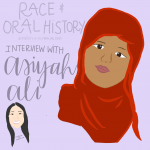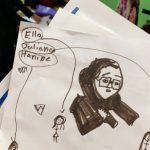This has been the most unconventional class I have taken, and in the best ways possible. It’s nice to be surrounded by people who share the same vision of the world as you so you can all grow together with integrity. I had never conducted an oral history before, and was not even familiar with the process. My initial understanding of an interview was very superficial, but as I began conducting my own oral history, I began to appreciate more of the process that often gets overlooked. There is a lot of preparation that goes into an oral history for it to run smoothly. I was very fortunate to be working with a brilliant group of girls at the United Women of East Africa Community and Cultural Center. Every time I went, I was so amazed and inspired by how hardworking, compassionate, and funny every one was. I am so appreciative that they welcomed us into their lives.
When listening to my oral history, you can tell that this was my first time doing it (ha!). I was interviewing a brilliant young girl, but I somehow got all nervous once I began recording. This experience was a first for both of us. Listening back to my interview, I’ve made several mental notes of what I will do differently when the time comes where I will conduct another oral history. For example, I had prepared a list of questions and I knew those questions were just a template as I didn’t know where the conversation would lead to and would have to adjust. If you are able to, try to predict the direction of the conversation so you will not sound as nervous as I did. And I think a good way to achieve this is the longer you spend time getting to know your interviewee (and them getting to know you), the better prepared you will be for the interview. Also test out the recording device. While I had thought I had understood every nuanced part of this device, when I was conducting my interview, I was still unsure whether or not it was picking up what we were saying. While it fortunately was recording, just save yourself some stress and short-term panic by testing it out multiple time.
After the interview, the conversation continued with me and the mother of my interviewee. There was a part that we all got emotional about, and that was when my interviewee was talking about her grandmother. When she was talking about her grandmother, it reminded me of my own grandparents and we were all tearing up. It was really nice to talk about the same values our cultures have with me being Chinese-American and them being Somali-American. And I think that this connection goes beyond the assignment. While we were all completing an assignment, I feel that the real reward comes with connecting with great people.




